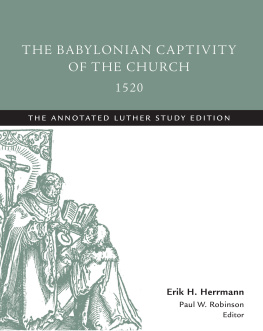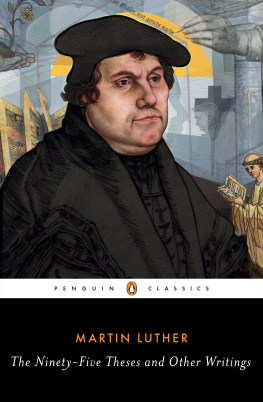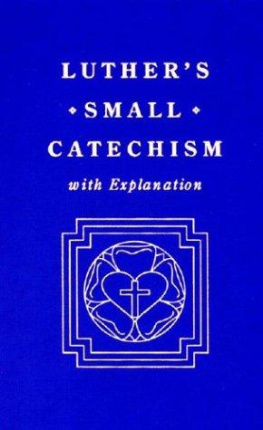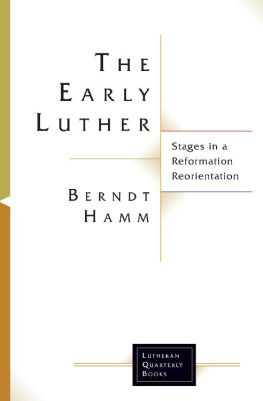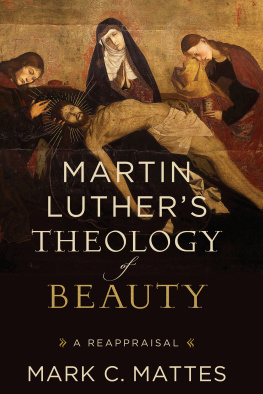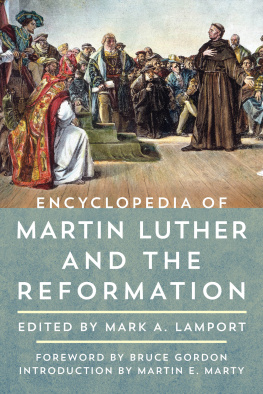Acknowledgments
When a project takes as long as this one has, there are many people to thanktoo many to do justice to here. Still, I wish to acknowledge a few people who have been central to the development of this work. It was while I was living and working in New York City that William Lazareths preaching initially grasped me and set my life on a very different course. It was he who first put Martin Luther into my hands and into my head. Then there were the extraordinary teachers whose own love for Luther continues to expand my understanding: George Forell, Scott Hendrix, Timothy Lull, and George Lindbeck. These scholars in particular stand out among the many whose work has influenced my thinking.
Special thanks must go also to Gene Outka and Margaret Farley, who invited me into a conversation that opened up a wider view of the Church, the place Luther occupies within it, and the possibilities that Luthers theology continues to provide today. Margaret Farleys careful and faithful work on human agency has served to focus my own questions, and her intellectual influence is discernible throughout the pages that follow. More than teachers, these scholars have been friends and mentors, encouraging, prodding, and urging me forward with a kind of vocational devotion that would have delighted Luther.
My colleagues here at Gustavus Adolphus College have likewise gifted me with their confidence and support; those within the Religion Department especially have helped me carve out the time necessary to complete this project. They have also challenged and informed my thinking with the generosity and care that exemplifies the best sort of scholarly solidarity.
In addition to these, I give special thanks to Linda Backman, my longtime friend and theological conversation partner, who first invited me to come hear Pastor Lazareth preach. Without Lindas hospitality and steady confidence I could not have stayed the course.
Finally I thank my family, and in particular my father, whose life in the ministry and in pursuit of meaning paved the way by teaching us the power of historical perspective and the importance of honoring curiosity for its own sake.
Br Martin Luther. Briefwechsel. 18 vols. in WA.
LW Luthers Works. Edited by Jaroslav Pelikan and Helmut T. Lehmann. Saint Louis: Concordia; Philadelphia: Fortress, 19581986.
Tr Martin Luther. Tischreden (Table Talk). 6 vols. in WA.
WA D. Martin Luthers Werke (Weimarer Ausgabe). Weimar: Bhlau, 18831993.
When Philip Watson produced a study of Luthers theology titled Let God Be God, many applauded this succinct rendering of Luthers prophetic theological vision. Thus, by recontextualizing the Reformation attack on pride and self-righteousness within a larger frameone that includes the experience of both women and menfeminist theologians have added a new dimension to an old debate about Luthers anthropology. Hampsons challenge, along with the growing body of literature that expresses similar concerns, raises important questions about the status and role of human agency in Luthers theology.
Valerie Saiving is usually credited with the initial insight that the Christian (and especially Reformation) doctrines of sin and grace are gender-specific. In her article The Human Situation: A Feminine View, But Saiving is interested in female development; and girls, she argues, have a potentially equal and opposite problem from their brothers. Rather than building up self-protective boundaries, separating themselves from their neighbors, women frequently suffer from inadequate personal boundaries, leaving them instead without a secure self-identity. Such an individual, according to Saiving, is therefore vulnerable to a loss of self in relationships with othersshe is too easily absorbed into the neighbor, whom she serves and from whom she is apt to seek an identity that is never her own. Thus, Saiving writes,
the temptations of women as women are not the same as the temptations of man as man, and the specifically feminine forms of sinfeminine not because they are confined to women or because women are incapable of sinning in other ways but because they are outgrowths of the basic feminine character structureshave a quality which can never be encompassed by such terms as pride and will-to-power. They are better suggested by such items as triviality, distractibility, and diffuseness; lack of an organizing center or focus; dependence on others for ones own self-definition; tolerance at the expense of standards of excellence; inability to respect the boundaries of privacy; sentimentality, gossipy sociability, and mistrust of reasonin short, underdevelopment or negation of the self.
In this underdevelopment, persons fall away from their God-given freedom and responsibility, becoming instead chameleon-like creatures, dependent upon others for affirmation and identity.
Judith Plaskow, in a dissertation published in 1980, Following her conviction that such differences are not inherent, but socially constructed, Plaskow takes up Saivings insight and carries it forward with a careful analysis of womens experience.
The key issue for Plaskow is the social construction of the feminine and the effects this has on womens self-identity.
Marthas lack of agencyher refusal to accept the responsibility for autonomous personhoodis her besetting sin. We might say, Plaskow suggests, that womens traditional tasks and characteristics are not problematical per se but become so when they are not chosen.
Both Saiving and Plaskow describe the feminine sin If self-assertion is a sin that invites judgment and transformation, she suggests, might not the failure to become a self be similarly displeasing to God, and likewise open to regeneration?
The question of what is pleasing and displeasing to God is an important one, particularly in light of the Kantian influences in Western culture that calls individuals to their duty as autonomous human beings. As we have seen so far, the experience of women, as it is manifested in a self-abnegating passivity, has itself been taken to justify the claim of divine condemnation. Plaskows confidence in divine judgment, however, is problematic, resting as it does on the assumption that nonflourishing is epistemologically sufficient to warrant the claim. Is her argument from nonflourishing really grounded in our created human nature? Or is it, like the socially constructed view of the feminine that Plaskow deplores, the reflection of (possibly sinful) cultural expectations?


